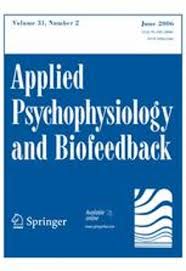Effectiveness of emWave Biofeedback in Improving Heart RateVariability Reactivity to and Recovery from Stress
Categories
Keywords
Categories
Keywords
- Show all
- ADHD
- Anxiety/Panic
- Burnout
- Cancer
- Cardiovascular disease
- Chronic pain
- Cognitive function
- Cortisol/DHEA
- Costs
- Dementia
- Depressie
- Diabetes
- Global Coherence
- Hypertension
- Intuition & Consiousness
- Kids/Youth
- Leadership
- Meditation/Mindfulness
- Metabolic Syndrome
- Obesity/Eating disorder
- Pregnancy
- PTSD
- Resilience
- Schizophrenia
- Science HRV & Coherence
- Sleep quality & fatigue
- Social Coherence
- Stress
Effectiveness of emWave Biofeedback in Improving Heart RateVariability Reactivity to and Recovery from Stress

The current study examined the efficacy of heart rate variability (HRV) biofeedback using emWave, a publicly available biofeedback device, to determine whether training affected physiological tone and stress responses. Twenty-seven individuals aged 18–30 years were randomized to a treatment or no-treatment controlgroup. Treatment participants underwent 4–8 sessions of emWave intervention, and all participants attended pre-treatment and post-treatment assessment sessions during which acute stressors were administered. Physiological data were collected at rest, during stress, and following stress. emWavetreatment did not confer changes in tonicmeasures of HRV or in HRV recovery following stress. However, treatment participants exhibited higher para-sympathetic responses (i.e., pNN50) during stress presentations at the post-treatment session than their control counterparts. No treatment effects were evident on self-reported measures of stress, psychological symptoms, or affect. Overall, results from the current study suggest that the emWave may confer some limited treatment effects by increasing HRV during exposure to stress. Additional development and testing of the emWave treatment protocol is necessary before it can be recommended for regular use in clinical settings, including the determination of what physiological changes are clinically meaningful during HRV biofeedback training.
Download the complete article, click here